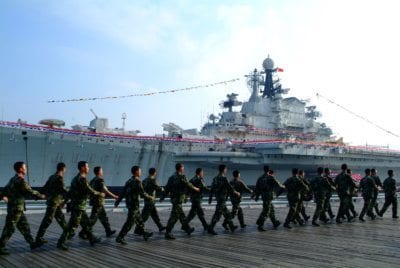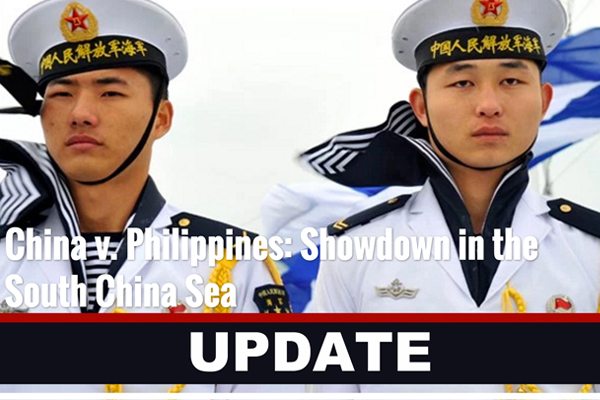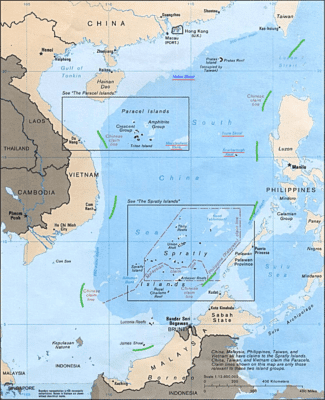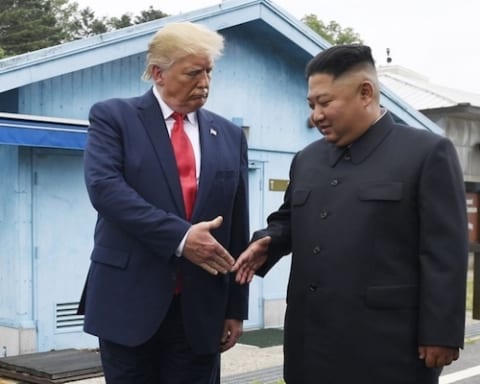Hague Rules Against China on South China Sea Dispute
As previously reported by Lima Charlie, on July 12, the United Nation’s Permanent Court of Arbitration at The Hague (PCA) was set to hand down a long-awaited landmark ruling in the dispute between the Philippines and China over the South China Sea. The decision would drive to the heart of not just the contentious dispute between China and the Philippines, but surrounding countries and interested stakeholders over use and control of the vast resources of the South China Sea.
In the Philippines’ complaint to the PCA, it challenged China’s claim to sovereignty over waters within an area known as the “nine-dash line”— a stretch of ocean the size of Mexico that officially appeared on Chinese maps beginning in 1974, a strategic key to shipping and maritime trade, natural resources and possible oil deposits. More than 5 trillion in trade pass through the region each year, with almost 60% of Taiwan’s and Japan’s—and 80% of China’s—crude oil imports. There is an estimated 11 billion barrels of oil and 190 trillion cubic feet of natural gas in the region, all of which is largely untapped. For a nation like China, with energy security issues, the South China Sea is worth its weight in gold.
China’s claims in the South China Sea have resulted in increased militarization of the region, with tensions mounting and the possibility of the U.S. being drawn into the fray.
Hague: No Evidence of China’s Historical Claims
In a landmark case, the PCA ruled unanimously today that there is no evidence China has historically established exclusive control over the waters and resources of the South China Sea. The tribunal found that China had violated the Philippines’ sovereign rights, and had caused “severe harm to the coral reef environment” by building artificial islands.
An 11 page press release issued by The Hague outlined the tribunal’s position. It concluded that “to the extent China has historic rights to resources in the waters of the South China Sea, such rights were extinguished to the extent they were incompatible with the exclusive economic zones provided for [under the United Nations Convention on the Law of the Sea].” It also concluded that “although Chinese navigators and fishermen, as well as those of other States, had historically made use of the islands in the South China Sea, there was no evidence that China had historically exercised exclusive control over the waters or their resources”. Stated clearly, the tribunal concluded there is no legal basis for China to claim historic rights to resources within the sea areas falling within the “nine-dash line”.
More specific to the Philippines’ claims, the PCA also found that China had violated the Philippines’ sovereign rights in its exclusive economic zone by (a) interfering with Philippine fishing and petroleum exploration, (b) constructing artificial islands, and (c) failing to prevent Chinese fishermen from fishing in the zone. The tribunal also held that fishermen from the Philippines (like those from China) had traditional fishing rights at Scarborough Shoal, and that China had interfered with these rights in restricting access. The tribunal further held that Chinese law enforcement vessels had “unlawfully created a serious risk of collision when they physically obstructed Philippine vessels.”
In an effort to establish the enforceability of the decision under international law, extensive discussion on the jurisdiction of the PCA was detailed. (As of the time of this writing, The Hague’s PCA case website remained mysteriously down).
Although the tribunal’s findings are legally binding, there is no mechanism to force China to abide by the ruling. Regardless, in no ambiguous terms, the ruling is a clear blow to China’s claims to the South China Sea, including reefs and islands also claimed by others.
Reacting to the decision, Philippines’ Foreign Affairs Secretary Perfecto Yasay, Jr., stated “Our experts are studying the award with the care and thoroughness that this significant arbitral outcome deserves. In the meantime we call on those concerned to exercise restraint and sobriety.” Prior to the decision, the Chinese Ministry for Foreign Affairs maintained its position that the tribunal has no jurisdiction over this matter and that “China neither recognizes nor accepts [any decision].” Chinese President Xi Jinping has rejected any decision.
However, some speculate that China may back off attacking the tribunal, taking a more conciliatory approach. Statements released by the Ministry of Foreign Affairs included hints at working towards “resolving disputes through peaceful negotiations and consultation” calling for “joint development in relevant maritime areas” for “win win results,” and that China would “hold the freedom of navigation.” Statements included representations that China would abide by “international law in the South China Sea” insuring unimpeded access to the shipping lines in the South China Sea.
 By calling for joint development and win-win results, coupled with the Philippines’ reaction to the ruling, there is a real possibility that the Philippines and China may have been negotiating a solution before the ruling.
By calling for joint development and win-win results, coupled with the Philippines’ reaction to the ruling, there is a real possibility that the Philippines and China may have been negotiating a solution before the ruling.
Rather than escalate the matter, in a face-saving gesture, China may try to resolve the situation as any business dispute, negotiating trade issues with interested parties. If this is the case, then we can expect to see Chinese investment quadruple not only in the Philippines, but in other nations in the region. As China flexes its economic leverage over the South China Sea, creating a “win win result for Beijing,” it will likely tighten its grip on the economy of the South China Sea and power over the region.
Of concern is that any economic negotiations serve to avert attention from China’s increased projection of military power over the region, via a steadily growing navy and heavily militarized artificial islands.
Follow Lima Charlie News as we track the story.
Raymond Pagnucco reporting, with Anthony A. LoPresti for Lima Charlie News.
Raymond Pagnucco (Senior Correspondent, Lima Charlie News). After receiving a degree in Asian Studies from SUNY Purchase, Raymond attended Beijing Sports University and Beijing Language and Culture University, before working as a cameraman, field producer and editor on various shows, including South Asian news channel Samaa Television, Fuji TV Network and Feature Story News. Raymond also shot and edited for Channel News Asia and China Central Television-America, and has contributed to Vice News, writing about Myanmar’s politics, the national ceasefire negotiations and ethnic armed groups. Raymond is currently based in Chiang Mai, Thailand.
Follow Raymond on Twitter @LimaCharlieNews
#LimaCharlie #LimaCharlieNews
https://twitter.com/RPagnuccoLC







![Blossoming Russo-Turkish alliance leaves U.S., NATO behind [Lima Charlie News]](https://limacharlienews.com/wp-content/uploads/2019/07/Russia-Turkey-alliance-leaves-U.S.-NATO-behind-480x384.png)



